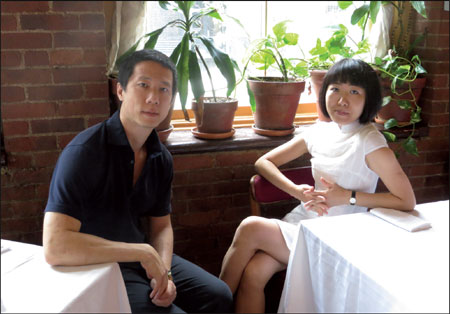Restaurateurs seek authenticity in NYC
Updated: 2013-07-24 10:54
By Caroline Berg in New York (China Daily)
|
||||||||
|
Bankers-turned restaurateurs, Xian Zhang (left) and Yiming Wang are owners of Cafe China, a Sichuan style restaurant awarded with one Michelin star this year. The two plan to open China Blue, based around the delicate flavors of Shanghai cuisine, by the end of the year. Caroline Berg / China Daily |
When the upscale Cafe China opened in Midtown Manhattan, people would call to ask if items like General Tso's chicken or Mu Shu pork were on the menu.
"Some of these Chinese foods that [customers] think about are really American Chinese foods," said Xian Zhang, co-owner of Cafe China. "We have to explain to them we do authentic Chinese food."
Zhang said some people leave when they find out their Chinese take-out favorites aren't on the menu. However, most people stay to test out the traditionally spicy Sichuan cuisine featured at the restaurant.
"After a first try, they come back, and every time they come back they become more open-minded to try something new," Zhang said. "We have a lot of people tell us they want to try everything on the menu, which is ambitious."
With a Michelin star to boast, Cafe China owners Zhang and Yiming Wang are working on a new venture in a landmark TriBeCa building built in 1891. China Blue, which the owners hope to open as early as November, will focus on Zhang's native Shanghai cuisine and have an interior design based on 1930s Shanghai.
"Shanghai cuisine is more organic," said Wang, who is in her late 30s and a native of Harbin in northeastern China. "It doesn't focus so much on the spice, but focuses more on the original taste of the elements."
Wang said they try to incorporate as many local and organic vegetables and fish as they can at Cafe China, which means regular solo trips for Zhang to the Union Square farmers market in Manhattan.
"It becomes a logistic problem," Zhang said. "Most local farmers will not ship [their products]."
Zhang said last year that the restaurant featured fresh flounder from Long Island. He found the texture beautiful and the taste unforgettable, but the fish itself very limited. Every time he would visit the farmers market, he said he would buy up about half of the vendor's supply.
Although purchasing locally and organically can be pricey, Zhang said the flavor differences make the ingredients worth the expense.
Wang expects prices at China Blue will range between $6 to early teens for appetizers, while entrees will be $16 and up. She said portions will be smaller compared to more traditional Chinese restaurants to encourage customers to explore the cuisine better.
"Our philosophy has always been that we want to be able to stand behind everything we put on the menu," Zhang said. "We are very focused on getting the flavor right and consistent with everything we offer."
Zhang voiced frustration over Shanghainese restaurants in New York that tend to focus on one special item, such as the famous Shanghai soup dumpling, but skimp on the quality of other menu offerings.
One of the greatest challenges the former banker said he has encountered in this business is finding a good Chinese chef. Zhang believes a significant part of the problem is the lack of Chinese cooking programs in culinary schools not only in New York, but also across the US in general.
"That's a disappointment for me," said Zhang, who is also in his late 30s and has lived in the US for more than 20 years. "As we progressed, we found that this is a major obstacle not only for us, but also for Chinese cuisine in America."
Zhang said there is a widespread problem of unskilled Chinese food chefs in the US who are more motivated by dollar signs than the craft of the trade. These chefs have become accustomed to cooking in the quick and easy Chinese take-out style, while the model of the classically trained Chinese chef is dying out, he said.
Zhang is interested in helping introduce Chinese culinary programs into schools, as well as offering classes in his restaurants. However, he said that he has found very few qualified Chinese food chefs in the US who are able to communicate effectively in English.
carolineberg@chinadailyusa.com

 Death toll in Spain train crash rises to 56
Death toll in Spain train crash rises to 56
 Royal baby named George Alexander Louis
Royal baby named George Alexander Louis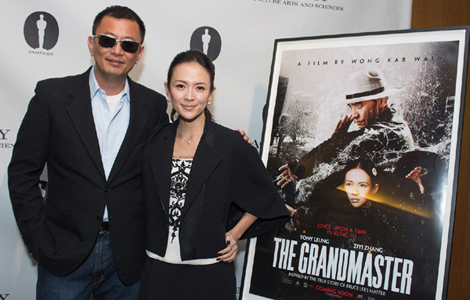
 'The Grandmaster' takes center stage
'The Grandmaster' takes center stage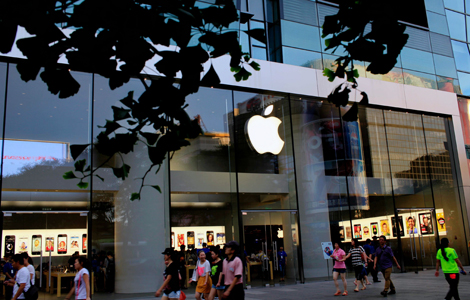
 Fewer Chinese consumers picking Apple's iPhone
Fewer Chinese consumers picking Apple's iPhone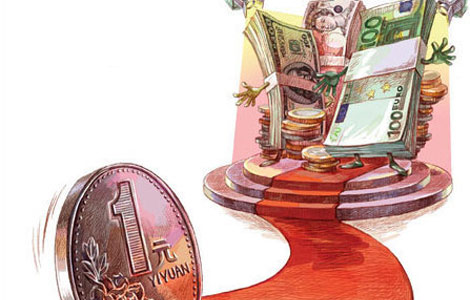
 Yuan: Financial capitals vying for top spot
Yuan: Financial capitals vying for top spot
 Little princes and princesses
Little princes and princesses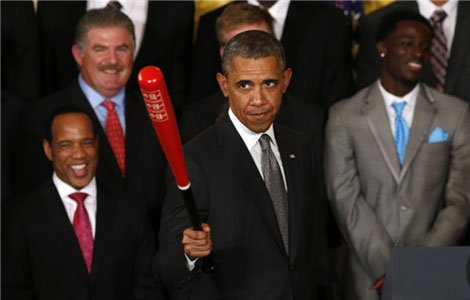
 Obama lauds Louisville in White House visit
Obama lauds Louisville in White House visit
 PLA special forces hold military contest
PLA special forces hold military contest
Most Viewed
Editor's Picks

|

|

|

|

|

|
Today's Top News
The cost of being an expat just keeps going up
New US consulate offers quicker service
Bo indicted for bribery, corruption and power abuse
Snowden's hopes of leaving airport dashed
US extends review of Shuanghui, Smithfield merger
'Few hundred' at Manila anti-China rally
Obama, Congress both losing public support
Smithfield deal will get 2nd vetting
US Weekly

|

|
